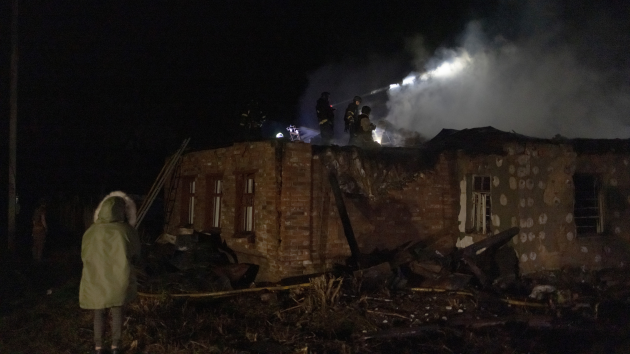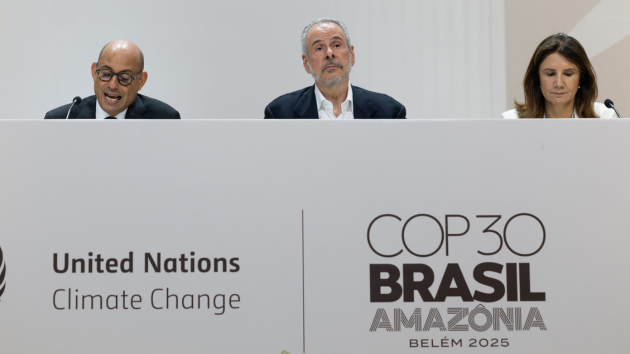Sudan now one of the ‘worst humanitarian nightmares in recent history’
Written by ABC Audio ALL RIGHTS RESERVED on October 25, 2023

(LONDON) — United Nations Humanitarian and Emergency Relief Chief Martin Griffiths has said half-a-year of war has plunged Sudan into “one of the worst humanitarian nightmares in recent history.”
As battles continue between the Sudanese Armed Forces (SAF) and Sudan’s Rapid Support Forces (RSF) paramilitary group, up to 9,000 people have been killed and over 5.6 million people have been displaced both within and outside national borders.
“For six months, civilians – particularly in Khartoum, Darfur and Kordofan – have known no respite from bloodshed and terror,” Griffiths said. “Horrific reports of rape and sexual violence continue to emerge, and clashes are increasingly taking place along ethnic lines, particularly in Darfur. This cannot go on.”
The U.S. State Department this week said it is “deeply concerned by credible reports” that the Rapid Support Forces have “intensified” shelling around Nyala, South Darfur and Karari Omdurman — a move the State Department says has “deepened” the suffering of the Sudanese people.
Six months on, Sudan’s paramilitary RSF has advanced to Khartoum, seeking to consolidate their reach in the capital with exception of some SAF strongholds. The SAF is reported to have secured bases in Eastern Sudan “headquartered at port Sudan along the Red Sea coast,” according to the United States Institute for Peace.
Meanwhile, the U.S. has called on shelling of civilian neighborhoods to be immediately ceased, saying “There is no acceptable military solution to this conflict – ‘victory’ by either side would exact an intolerable toll on the Sudanese people and their nation.”
Fighting erupted in Sudan on April 15, a culmination of weeks of tensions linked to a planned transition to civilian rule. General Abdel-Fattah Burhan, commander of the Sudanese Armed Forces, and General Mohammed Hamdan Dagalo, head of the Rapid Support Forces — once allies who jointly orchestrated a military coup in 2021 — are now engaged in a vicious power struggle.
But millions have since been caught in the middle as Sudan has now become the “largest internal displacement crisis in the world,” according to the U.N.
“The situation now is the worst-case scenario,” Jon Temin, vice president of policy and programs at the Truman Center for National Policy in Washington, D.C., told ABC News in May. “The two generals seem pretty set on fighting it out and seeing who wins, and an incredible number of people are going to suffer along the way.”
But as war rages on in the country, Sudan’s health system is struggling and has been pushed to its breaking point.
“Emergency rooms are congested, and many hospitals have closed completely. In the capital, Khartoum, MSF medical teams are witnessing one of the most intense urban conflicts currently taking place worldwide,” says the MSF. “Large numbers of injured people are arriving at the hospitals with life threatening wounds, often leaving medical staff with no choice but to amputate.”
The MSF announced this week that it has had “no choice” but to suspend surgery in Khartoum’s Bashair Teaching Hospital as military authorities suspend the transport of surgical materials from Wad Madani to south Khartoum.
“Despite repeated engagements with the health authorities since, these critical supplies remain blocked and stocks in the hospital are now depleted,” said Michiel Hofman, MSF’s operations coordinator for Sudan.
In a joint statement, the Federal Ministry of Health and state ministries of health in Sudan, UNICEF and the World Health Organization (WHO) warn further disruptions on health services could cost over 10,000 young lives by the end of the year, saying “About 70% of hospitals in conflict-affected states are not functional. WHO has verified 58 attacks on health care to date, with 31 deaths and 38 injuries of health workers and patients.”
Elsewhere, the U.S. has called on warring parties to oblige by their commitments under the Jeddah Declaration of Principles to Protect Civilians, “including by allowing unhindered humanitarian access, protecting civilians and their humanitarian rights, and upholding international humanitarian law,” said Matthew Miller. “It is time for this conflict and the suffering of the Sudanese people to end.”
Copyright © 2023, ABC Audio. All rights reserved.

 KVSP
KVSP 



